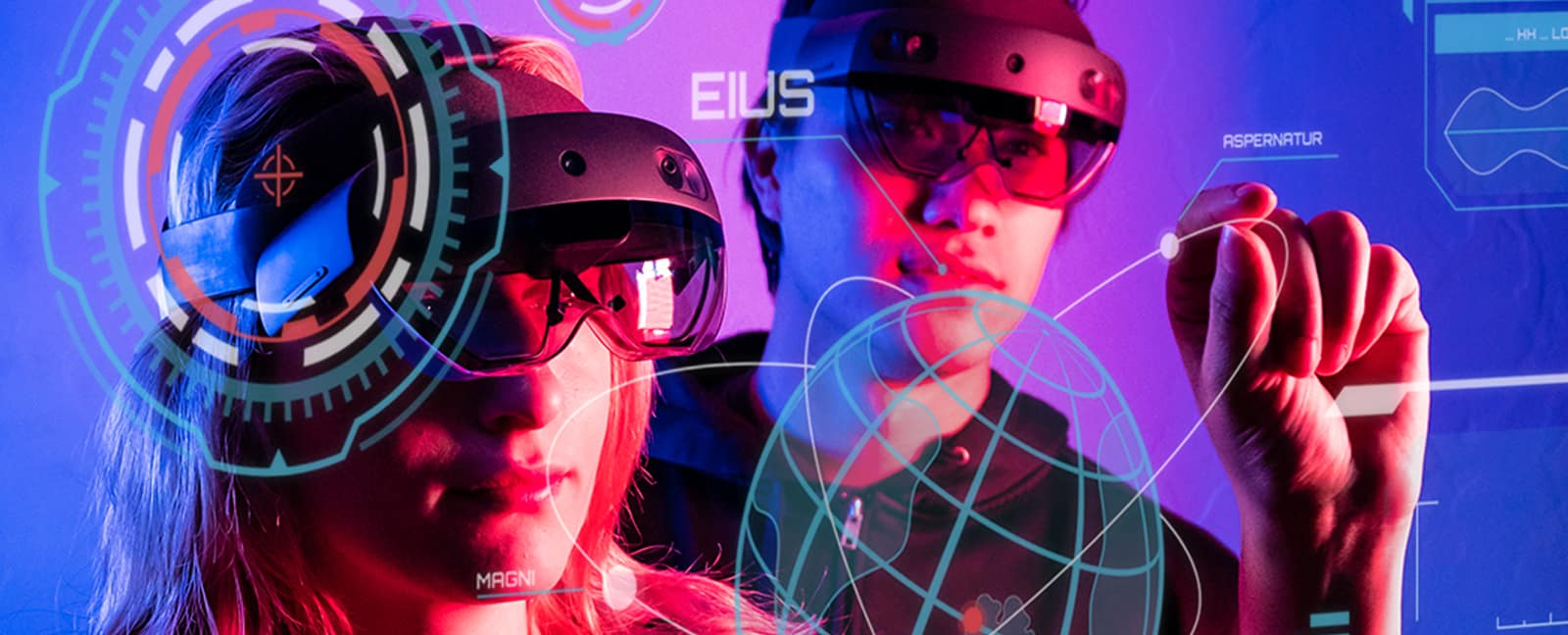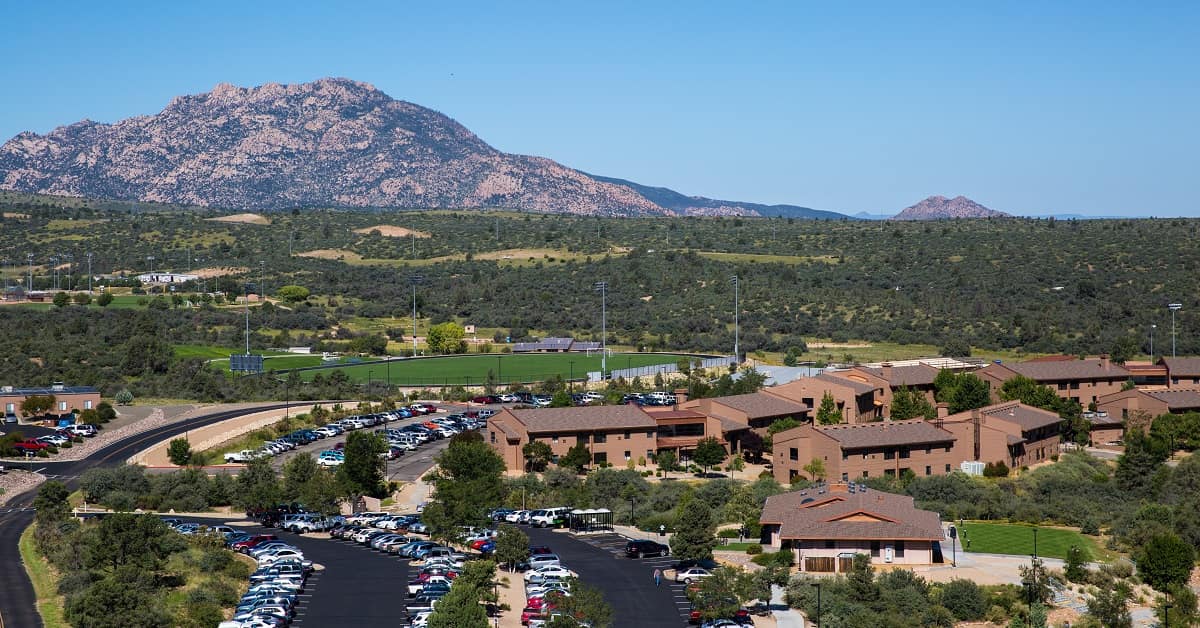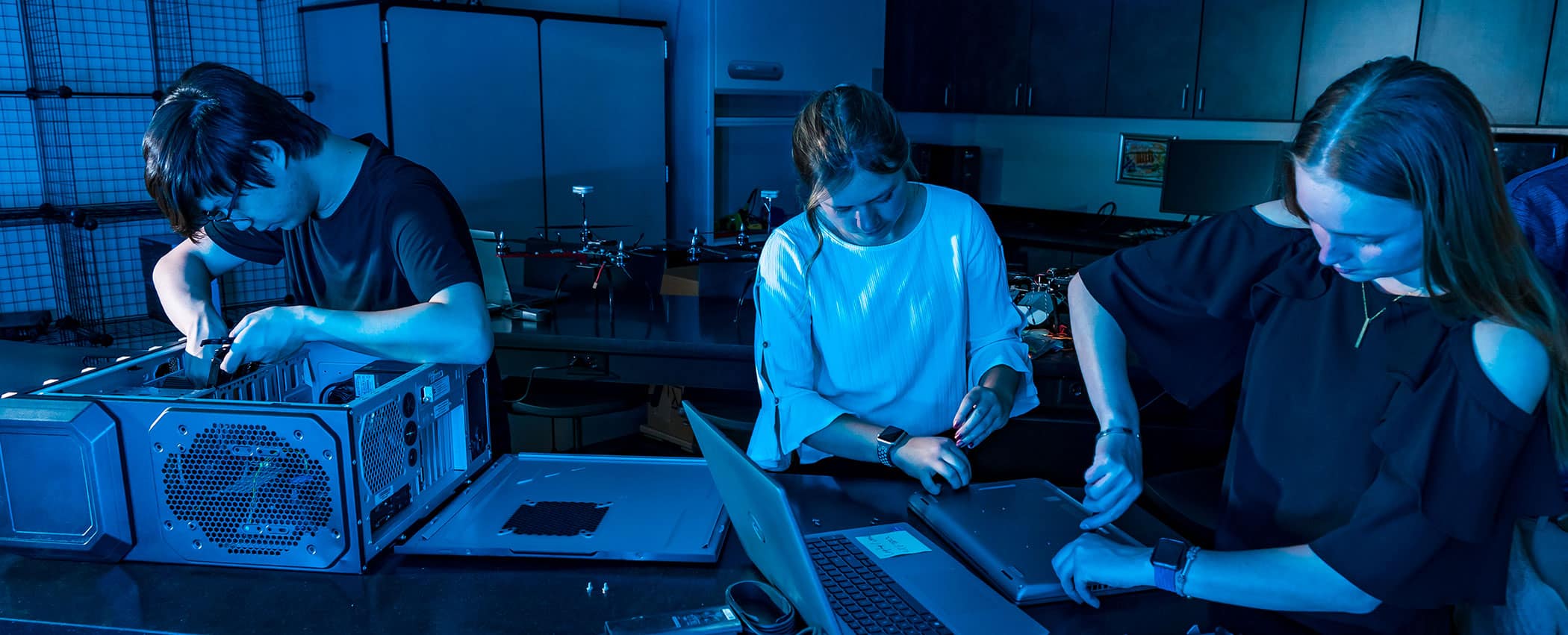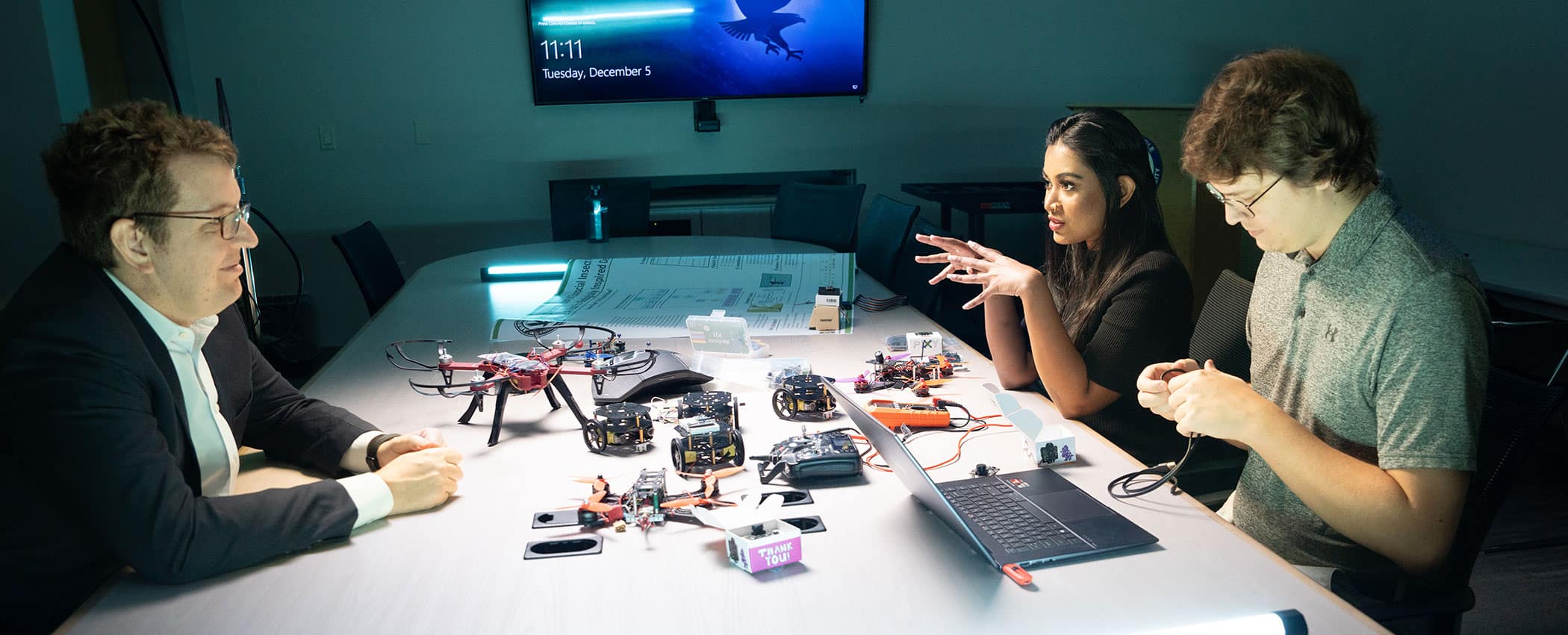
Bachelor of Science in
Simulation Science, Games and Animation
The B.S. in Simulation Science, Games and Animation prepares students for career paths that include game design, simulation science and software development.
About the Bachelor of Science in Simulation Science, Games and Animation
The B.S. in Simulation Science, Games and Animation (SSGA) aims to advance student knowledge through content creation, interdisciplinary research and development. The program provides students with a solid foundation in simulation science, game production and animation while providing interactive, immersive experiences that utilize emerging technology.
Students engage in project-based courses designed to foster collaboration and innovation. By designing virtual worlds and user experiences, they develop essential skills for team-based development in video games, spatial computing and simulations. Utilizing industry-standard applications and cutting-edge equipment, students acquire the expertise necessary for effective game design and development, preparing them for professional success in this exciting field.
Why You Should Study This Degree
Simulation Science, Games and Animation focuses on modeling real-world processes through entertainment and moving images. A career in simulation and animation may be for you if you like:
- Creating interactive digital environments
- Designing complex systems
- Exploring visual storytelling techniques
- Developing virtual worlds, storylines, applications and more
Student Learning Outcomes
Opportunities you will have as a simulation major:
- Use prototyping to test and refine new ideas for larger-scale development.
- Construct interactive programs using software development principles and methods.
- Create appealing user experience through engaging storytelling, worldbuilding and interface design.
- Apply software design principles to produce functional and informative user experiences.
- Incorporate aesthetic concepts in content creation.
- Synthesize technical and creative domains to solve design problems.
- Collaborate to exchange and interact with different ideas through conflict, analysis and consensus.
Simulation Science, Games and Animation Career Opportunities
Careers and Employers
Setting the standard, Embry-Riddle graduates are set to enter the workforce in top companies, including:
- Blizzard Entertainment
- Disney Imagineering
- Forge Effects
- Industrial Light and Magic
- Microsoft Corporation
Graduates with a Simulation Science degree often secure roles as:
- AI Programmer
- Graphics Programmer
- Lead Programmer
- Network Programmer
- Physics Programmer
- Tools Programmer
- User Interface Programmer
Simulation Science, Games and Animation Salary Information
A degree from Embry-Riddle provides the opportunity for competitive salaries in security, averaging $130,160 annually, as of 2024.
DETAILS
About Simulation Science, Games and Animation at the Prescott, AZ Campus
Embry-Riddle's Simulation Science, Games and Animation degree provides students with a solid foundation in computer game technology, surpassing mere programming or software basics. Drawing on Embry-Riddle's expertise in aviation, engineering and intelligence, students acquire exceptional knowledge that allows them to bring their vision to life — virtually.
Graduates of this program are well prepared for rewarding careers in game design, entertainment, software development and diverse fields such as military and intelligence, high-tech manufacturing and aviation. This degree combines STEM courses with art and design components, delivering a comprehensive education for students majoring in this field.
Simulation Science, Games and Animation Information
- Credits: 127
- Online or In-Person: In-Person
- Capstone: Capstone and Lab (8 credits)
Helpful Links
- Tour our Prescott Campus
- Discover the College's Faculty
- Explore the Fields of Study: Computers & Technology, Engineering and Applied Science
- Find Related Clubs & Organizations
Student Learning Outcomes
Students will:
- Use prototyping to test and refine new ideas for larger scale-development.
- Construct interactive programs using software development principles and methods.
- Create appealing user experience employing principles and methods of engaging storytelling, worldbuilding, and interface design.
- Apply software design principles to produce functional and informative user experiences.
- Incorporate aesthetic concepts in content creation.
- Synthesize technical and creative domains to solve design problems.
- Collaborate to maturely exchange and interact with different ideas through conflict, analysis and consensus.
- Effectively exchange constructive criticism.
Degree Requirements
The Bachelor of Science degree can be earned in eight semesters assuming appropriate background and full-time enrollment. Successful completion of a minimum of 127 credit hours is required. Students entering this program should have demonstrated a competence in mathematics and science (preferably physics). They should be prepared to enter Calculus I, having demonstrated proficiency in algebra and trigonometry. The Simulation, Games and Animation program is designed to prepare students to work as part of a team on the development of simulation systems and games. Relevant concepts, methods, and techniques are integrated through the curriculum. The curriculum includes courses in general education, media arts, computer programming, mathematics, and software design.
Students should be aware that several courses in each academic year may have prerequisites and/or co-requisites.
Program Requirements
General Education
Embry-Riddle degree programs require students to complete a minimum of 36 hours of General Education coursework. For a full description of Embry-Riddle General Education guidelines, please see the General Education section of this catalog.
Students may choose other classes outside of their requirements, but doing so can result in the student having to complete more than the degree's 127 credit hours. This will result in additional time and cost to the student.
| Communication Theory and Skills | 9 | |
| Computer Science/Information Technology | 3 | |
| Mathematics | 6 | |
| Physical and Life Sciences (Natural Sciences) | 6 | |
| Humanities and Social Sciences | 12 | |
3 hours of Lower-Level Humanities | ||
3 hours of Lower-Level Social Science | ||
3 hours of Lower-Level or Upper-Level Humanities or Social Science | ||
3 hours of Upper-Level Humanities or Social Science | ||
| Total Credits | 36 | |
Simulation Science, Games, and Animation Core (124 Credits)
The following course of study outlines the quickest and most cost-efficient route for students to earn their B.S. in Simulation Science, Games, and Animation. Students are encouraged to follow the course of study to ensure they complete all program required courses and their prerequisites within four years.
Courses in the core with a # will satisfy your general education requirements.
| COM 122 | English Composition # | 3 |
| CS 118 | Fundamentals of Computer Programming # | 3 |
| CS 125 | Computer Science I | 4 |
| CS 225 | Computer Science II | 4 |
| CS 315 | Data Structures and Analysis of Algorithms | 3 |
| DS 411 | Data Visualization | 3 |
| General Education - Communications Elective # | 6 | |
| General Education - Humanities Lower-Level Elective # | 3 | |
| General Education - Humanities or Social Science Upper-Level Elective # | 3 | |
| General Education - Natural Science Elective with Lab # | 4 | |
| MA 225 | Introduction to Discrete Structures # | 3 |
| MA 241 | Calculus and Analytical Geometry I # | 4 |
| MA 314 | Applied Linear Algebra & Statistics | 3 |
| PS 113 | Introductory Physics I # | 3 |
| or PS 215 | Physics I | |
| PSY 101 | Introduction to Psychology (OR Social Science Lower-Level Elective) # | 3 |
| PSY 321 | Psychology of Gaming (OR Humanities or Social Science Upper-Level Elective) # | 3 |
| SIM 115 | Digital Illustration | 3 |
| SIM 150 | Games Systems I Introduction | 3 |
| SIM 201 | World Building I Modeling | 3 |
| SIM 202 | World Building II Materials | 3 |
| SIM 203 | World Building III Mechanics | 3 |
| SIM 205 | Game Design Workshop | 3 |
| SIM 215 | Interactive Media I | 3 |
| SIM 251 | Game Systems II Multi-player | 3 |
| SIM 304 | World Building IV Motion | 3 |
| SIM 315 | Interactive Media II | 3 |
| SIM 321 | Simulation I Systems Modeling | 3 |
| SIM 331 | Simulation II Procedural Modeling | 3 |
| SIM 335 | Game Engine Architecture | 3 |
| SIM 351 | Game Systems III Production | 3 |
| SIM 401 | Character Design & Production | 3 |
| SIM 403 | Set & Environment Design | 3 |
| SIM 415 | User Interface Design | 3 |
| SIM 421 | Modeling & Simulation II | 3 |
| SIM 450 | Game Systems 4: Mixed Reality | 3 |
| SIM 455 | Artificial Intelligence | 3 |
| SIM 482 | Capstone I and Lab | 4 |
| SIM 483 | Capstone II and Lab | 4 |
| UNIV 101 | College Success | 1 |
Technical Elective (3 Credits)
| Any upper-level course in SIM, CS, DS, SE, MA, CI | 3 | |
| Total Credits | 127 | |
- #
General Education Courses
All Army ROTC students are required to complete SS 321 - U.S. Military History 1900-Present (3 credits) in order to commission.
Suggested Plan of Study
| Freshman Year | ||
|---|---|---|
| Fall | Credits | |
| COM 122 | English Composition | 3 |
| CS 118 | Fundamentals of Computer Programming | 3 |
| Humanities Lower-Level Elective | 3 | |
| SIM 201 | World Building I, Modeling | 3 |
| SIM 115 | Digital Illustration | 3 |
| UNIV 101 | College Success | 1 |
| Credits Subtotal | 16.0 | |
| Spring | ||
| CS 125 | Computer Science I | 4 |
| MA 241 | Calculus and Analytical Geometry I | 4 |
| SIM 150 | Games Systems I Introduction | 3 |
| SIM 202 | World Building II Materials | 3 |
| SIM 215 | Interactive Media I | 3 |
| Credits Subtotal | 17.0 | |
| Sophomore Year | ||
| Fall | ||
| CS 225 | Computer Science II | 4 |
| MA 225 | Introduction to Discrete Structures | 3 |
| PS 113 | Introductory Physics I | 3 |
or PS 215
|
Physics I | |
| SIM 203 | World Building III Mechanics | 3 |
| SIM 251 | Game Systems II Multi-player | 3 |
| Credits Subtotal | 16.0 | |
| Spring | ||
| MA 314 | Applied Linear Algebra & Statistics | 3 |
| PSY 101 | Introduction to Psychology (Or Social Science Lower-Level Elective) | 3 |
| SIM 205 | Game Design Workshop | 3 |
| SIM 304 | World Building IV Motion | 3 |
| SIM 315 | Interactive Media II | 3 |
| Credits Subtotal | 15.0 | |
| Junior Year | ||
| Fall | ||
| CS 315 | Data Structures and Analysis of Algorithms | 3 |
| SIM 321 | Simulation I Systems Modeling | 3 |
| SIM 335 | Game Engine Architecture | 3 |
| SIM 351 | Game Systems III Production | 3 |
| SIM 401 | Character Design & Production | 3 |
| Credits Subtotal | 15.0 | |
| Spring | ||
| SIM 455 | Artificial Intelligence | 3 |
| PSY 321 | Psychology of Gaming (or Humanities or Social Science Upper-Level Elective) | 3 |
| SIM 331 | Simulation II Procedural Modeling | 3 |
| SIM 415 | User Interface Design | 3 |
| SIM 450 | Game Systems 4: Mixed Reality | 3 |
| Credits Subtotal | 15.0 | |
| Senior Year | ||
| Fall | ||
| Communications Elective | 3 | |
| DS 411 | Data Visualization | 3 |
| SIM 403 | Set & Environment Design | 3 |
| SIM 482 | Capstone I and Lab | 4 |
| Technical Elective (Upper-division SIM, CS, DS, SE, MA, CI) | 3 | |
| Credits Subtotal | 16.0 | |
| Spring | ||
| Communications Elective | 3 | |
| Humanities or Social Science Upper-Level Elective | 3 | |
| Natural Science Elective with Lab | 4 | |
| SIM 421 | Modeling & Simulation II | 3 |
| SIM 483 | Capstone II and Lab | 4 |
| Credits Subtotal | 17.0 | |
| Credits Total: | 127.0 | |
Get Started Now:
Summary
127 Credits
Estimate your tuition by using the Tuition Calculator
View Financial Aid Information
Learn about our General Education
Find out about transferring credits to this degree
Learn more about our Veterans & Military benefits
View our Academic Calendar




